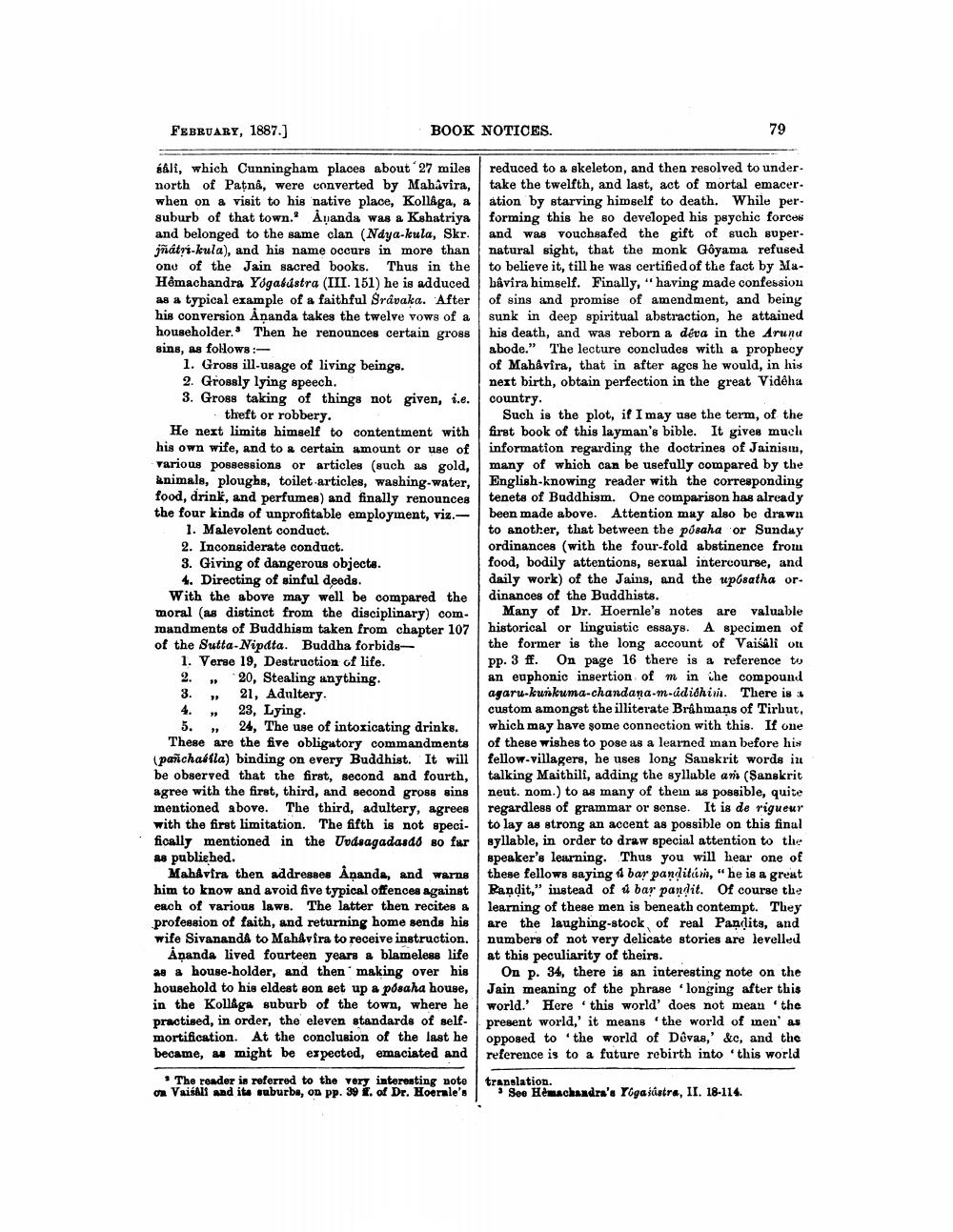________________
FEBRUARY, 1887.)
BOOK NOTICES.
79
sali, which Cunningham places about 27 miles north of Patna, were converted by Mahavira, when on a visit to his native place, Kollága, a suburb of that town. Avanda was a Kshatriya and belonged to the same clan (Ndya-kula, Skr. jñátyi-kula), and his name occurs in more than one of the Jain sacred books. Thus in the Hêmachandra Yogabústra (III. 151) he is adduced as a typical example of a faithful Sravaka. After his conversion Ananda takes the twelve vows of a householder. Then he renounces certain gross sins, as follows:
1. Gross ill-usage of living beings. 2. Grossly lying speech. 3. Gross taking of things not given, i.e.
theft or robbery. He next limits himself to contentment with his own wife, and to a certain amount or use of various possessions or articles (such as gold, &nimals, ploughs, toilet -articles, washing-water, food, drink, and perfumes) and finally renounces the four kinds of unprofitable employment, viz.
1. Malevolent conduct. 2. Inconsiderate conduct. 3. Giving of dangerous objects.
4. Directing of sinful deeds. With the above may well be compared the moral (as distinct from the disciplinary) com. mandments of Buddhism taken from chapter 107 of the Sutta-Nipdta. Buddha forbids
1. Verse 19, Destruction of life. 2. 20, Stealing anything. 3. 21, Adultery. 4. , 23, Lying.
5. 24, The use of intoxicating drinks. These are the five obligatory commandments (panchabíla) binding on every Buddhist. It will be observed that the first, second and fourth, agree with the first, third, and second gross sins mentioned above. The third, adultery, agrees with the first limitation. The fifth is not speci. fically mentioned in the Uvdsagadasdd so far as publiehed.
Mahavira then addresses Åņande, and warns him to know and avoid five typical offences against each of various laws. The latter then recites a profession of faith, and returning home sends his wife Sivanandå to Mahåvira to receive instruction.
Apanda lived fourteen years a blameless life as a house-holder, and then making over his household to his eldest son set up a pásaha house, in the Kolléga suburb of the town, where he practised, in order, the eleven standards of self- mortification. At the conclusion of the last he became, as might be expected, emaciated and
reduced to a skeleton, and then resolved to under. take the twelfth, and last, act of mortal emacer. ation by starving himself to death. While performing this he so developed his peychic forces and was vouchsafed the gift of such supernatural sight, that the monk Göyama refused to believe it, till he was certified of the fact by Mabâvira himself. Finally, having made confessiou of sins and promise of amendment, and being sunk in deep spiritual abstraction, he attained his death, and was reborn a déva in the Arunu abode." The lecture concludes with a prophecy of Mahavira, that in after ages he would, in his next birth, obtain perfection in the great Vidêhu country.
Such is the plot, if I may use the term, of the first book of this layman's bible. It gives much information regarding the doctrines of Jainisin, many of which can be usefully compared by the English-knowing reader with the corresponding tenets of Buddhism. One comparison has already been made above. Attention may also be drawn to another, that between the pusaha 'or Sunday ordinances (with the four-fold abstinence from food, bodily attentions, sexual intercourse, and daily work) of the Jains, and the uposatha or. dinances of the Buddhists.
Many of Dr. Hoernle's notes are valuable historical or linguistic essays. A specimen of the former is the long account of Vaišal on pp. 3 ff. On page 16 there is a reference to an euphonic insertion of m in the compound agaru-kurkuma-chandana-m-adithin. There is . custom amongst the illiterate Brahmans of Tirhut, which may have some connection with this. If one of these wishes to pose as a learned man before his fellow-villagers, he uses lony Sanskrit words in talking Maithili, adding the syllable an (Sanskrit neut. nom.) to as many of them as possible, quite regardless of grammar or sense. It is de rigueur to lay as strong an accent as possible on this final syllable, in order to draw special attention to the speaker's learning. Thus you will hear one of these fellows saying 1 bar panditun," he is a great Bandit," instead of a bar pandit. Of course the learning of these men is beneath contempt. They are the laughing-stock, of real Pandits, and numbers of not very delicate stories are levelled at this peculiarity of theirs.
On p. 34, there is an interesting note on the Jain meaning of the phrase "longing after this world. Here this world' does not mean the present world,' it means the world of men' as opposed to the world of Dêvas,' &c, and the reference is to a future rebirth into this world
The reader in referred to the very interesting note on Vaisali and its suburbe, on pp. 39 . of Dr. Hoernle's
translation.
See Hémachandra's Yogasastra, II. 18-114.




